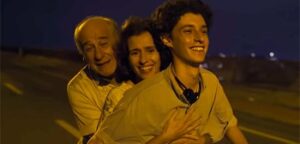Hand of God
 “Hand of God” opens with a beautiful young lady meeting with her priest. He advises she kiss the “little monk.” We’re not sure if he’s simply a boy dressed as a monk, or a real monk. But she kisses him on the forehead and then returns to her apartment, where her husband accuses her of adultery and strikes her so hard he draws blood. Distraught, the woman calls her sister, who comes over in the middle of the night to console her.
“Hand of God” opens with a beautiful young lady meeting with her priest. He advises she kiss the “little monk.” We’re not sure if he’s simply a boy dressed as a monk, or a real monk. But she kisses him on the forehead and then returns to her apartment, where her husband accuses her of adultery and strikes her so hard he draws blood. Distraught, the woman calls her sister, who comes over in the middle of the night to console her.
Ironically, “Hand of God” turns out to not be so much about the accused adulterer as about the sister and her family – specifically her younger boy, Fabietto (or Fabi, as his friends call him). In fact, it takes Paolo Sorrentino’s latest film a while to settle in on its topic. In this respect, it plays out somewhat like a Simpsons episode, in which we don’t know the direction it will take for some time.
Autobiographical
It turns out “Hand of God” is a deeply personal, autobiographical, coming-of-age story about how Sorrentino (nee Fabi) first discovers his love for film and his desire to become a filmmaker. Taking place exclusively in the Italian city of Naples, Sorrentino’s original screenplay eventually focuses on young Fabi and those around him. As is typical of a large Italian family, most of those we meet are his extended family – including his beautiful, perhaps unfaithful, aunt – who has a habit of nude sunbathing in front of the rest of the family.
Fellini connection
It’s no secret that young Fabi has an interest in film; and the great Federico Fellini just so happens to be shooting his latest picture in and around Naples during the time frame of “Hand of God.” Ironically, Sorrentino populates his film with a certain measure of the odd and mildly grotesque characters common to a Fellini film. One morbidly obese aunt brings her new boyfriend to a family picnic – a man who has lost his voice and speaks through a strange electronic device. These two would seem to have nothing to do with the story, save for fleshing out Fabi’s circle of acquaintances.
Also common to a Fellini film would be Fabi’s puberty, and the advice of those around him. Even his father willingly discusses what Fabi’s first sexual experience is likely to involve. Again, a la Fellini, Fabi’s desires finally come to fruition with an older, experienced woman, in a scene best described as uncomfortable.
Fabi strikes up a friendship with a freewheeling and carefree cigarette (and presumably drug) smuggler he first encounters on a family boating trip. This man has a beautiful sister about whom Fabi undoubtedly fantasizes. In a very realistic manner, Sorrentino’s screenplay fortunately does not allow Fabi to act on his feelings toward the sister – nor to his often-naked aunt.
Lack of focus
If you get the idea that “Hand of God” is one of those slice-of-life films that seems to lack focus, you would be correct. Again, the “story” here is simply that of a young boy discovering direction in life. And much as in real life, the tone of the film shifts wildly – from humor and good times to immediate tragedy. Sections of “Hand of God” are heavy. But everything we see on screen is, presumably, part of Sorrentino’s personal story during that summer of 1986 when his life seemed to come into focus.
 The cast
The cast
Newcomer Filippo Scotti plays Fabietto, and veteran Italian actors Toni Servillo and Teresa Saponangelo are his loving and supportive parents, Saverio and Maria. Maria has a passion for playing somewhat over-the-top practical jokes, and Fabi’s older brother Marchino (Marlon Joubert) would love to land a role in a motion picture. But for the most part, Fabi’s family is the glue that holds the extended family together. They are as nuclear as can be expected in a Sorrentino (or a Fellini) film.
Film doesn’t gel
Sorrentino won the Best Foreign Language Oscar for 2013’s “La Grande Bellezza,” and he may just do it again in 2021. “Hand of God” is Italy’s submission for this year’s awards. But I can’t say that “Hand of God” is a great film. I enjoyed many aspects of it, but it tends to be “all over the map” in terms of its target. I appreciated knowing about Sorrentino’s awakening, but “Hand of God” doesn’t gel together well. I like many of its parts, but the big picture needs more direction. What is Sorrentino trying to say? What are we to take from watching this film? On the other hand, Fellini sometimes suffered from the same lack of focus. So, if Sorrentino is following in the footsteps of his idol, he has succeeded.
Andy Ray‘s reviews also appear on https://youarecurrent.com/category/nightandday/film-reviews/.